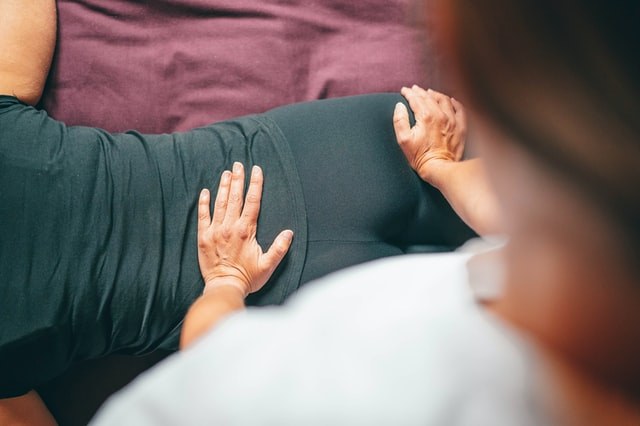Up to one third of the UK population will experience lower back pain each year. Up to 2.6 million of these will seek medical advice. The lower back, or lumbar region, refers to the part of your back that sits below your ribs. Back pain is the most common cause of work-related illnesses, and those reporting lower back pain on average took up to 14 days off work in 2018.
But what causes lower back pain, and how do you treat it? Read on to learn more about what lower back pain is and how to alleviate it.
What Does Lower Back Muscle Strain Feel Like?
People can feel different levels of lower back pain. These could be sudden pains (acute), or longer term pains (chronic), that last 3 months or more. You may feel a persistent dull ache in your lower back, which is more irritating than painful, or severe stabbing pains which come and go, but make it difficult to perform daily tasks.
Specific examples of lower back pain could include:
- Spasms or muscle tightness in the lower back region, which may extend to the hips and thighs.
- Pain that begins after prolonged periods sitting down, transitions from sitting to standing, or when walking.
- Stabbing pains in the lower back when you try to stand fully upright.
- A dull pain or persistent ache, limited to the lower back.
- A pain that can range from tingling to burning, which may begin in the lower back and move down to your feet (sciatica).
- Pain that happens immediately after a specific action, like lifting, bending or stretching.
Sharp, stabbing pains are known as radicular pain and normally linked to the nerves, while mechanical pain is related to the muscles and normally activated by spinal movement.
How Long Does Lower Back Pain Last?
Lower back pain can last from a few days to a few weeks, depending on the severity of the injury or cause of the pain. This form of lower back pain is normally known as acute back pain, and resolves within a few weeks.
Sub-acute back pain refers to those who experience persistent lower back pain even after a few weeks, but with symptoms that persist up to a 3-month period. Over these time frames, individuals experiencing lower back pain might see an increased frequency or level of pain, but these should reduce in severity after a few months.
About 20% of individuals with lower back pain experience chronic back pain. This refers to individuals who have not noticed an improvement in pain by three months, and whose symptoms have become more frequent or severe over time.
What Are the Causes Of Lower Back Pain?

Back pain is commonly caused by lifting something heavy, or extended exercise. If you don’t warm-up or warm-down after exercise, you may expose yourself to lower back pain. You may also get lower back pain if you don’t pick up heavy objects correctly. This is because these actions cause muscle strain in the lower back.
There are also small disks in your spine, which are filled with liquid and meant to cushion the vertebrae in your back. Sometimes, these might break or expand, putting additional pressure on nerves. One of the major nerves in your back is called the sciatic nerve, which runs from your lower back down to your spine.
If pressure is put on this nerve, you may experience a tingling feeling from your back down one of your knees. This is known as sciatica. A damaged disk is known as a herniated disk and can cause severe and debilitating back pain. This can be caused by many factors, like obesity, degeneration, age, or in rare cases a fall or injury.
Poor posture can also cause back pain when sitting down at work, or persistent injury caused by a daily action that puts increased pressure on your back. This could be as simple as carrying a heavy bag on your shoulder every day.
Sometimes, an underlying condition might sometimes cause lower back pain, like:
- Arthritis and osteoporosis
- Fibromyalgia - long term pain in the muscles
- Kidney or bladder problems
- Spinal stenosis - the space around the spinal cord becomes smaller, putting pressure on your nerves
- Pregnancy
- Spondylitis - inflammation of the joints between bones in the spine
- Ovarian cysts
- Some forms of cancer
- Ankylosing spondylitis
If your back pain lasts over 3 days and does not improve after rest, you should consult your GP.
What Can I Do To Relieve My Lower Back Pain?
Resting your back is the first thing you should do if you have lower back pain. In the longer term, maintaining a healthy lifestyle, losing weight and quitting smoking could help prevent lower back pain in the future.
Over the counter medicines like ibuprofen can reduce swelling and therefore pain. Your GP might also recommend other courses of medication, like steroids, or morphine, depending on the severity of the pain.
Your doctor may recommend physical therapy as a form of treatment. This will include:
- Passive forms - like heat or cold treatments, massage, and electrical stimulation.
- Active forms - activities including stretches (like yoga) or low-impact exercises to restore strength and movement to the spine.
You could also be referred to a chiropractor, who helps manage and restore joint function in the body.
If these methods do not help, you may be referred for surgery. This is normally only considered for chronic pain beyond six months. This is often used for herniated disks, where a disk is replaced in a similar way to a hip replacement.
Other forms of surgery include spinal fusion, where vertebrae are fused together to reduce movement. This is only recommended when the vertebrae movement is the primary cause of the original pain.
When Should I Go To the Doctor For Lower Back Pain?
If your pain lasts over three days, you should consult your doctor. If your lower back pain is caused by a fall or injury, you should visit your doctor immediately after the accident.
If you are experiencing back pain alongside any of the following symptoms:
- Fever
- Dizziness
- Loss of bladder control
- Pain when coughing or using the bathroom
- Muscle weakness (primarily the legs)
- Pain which spreads down your legs to below the knee
- Unexplained weight loss
You should seek medical attention immediately. You should also visit your GP if the pain doesn’t improve after resting.
If you are concerned about your persistent lower back pain, call us today. We have centres across southern Britain with specialists who can help you find the primary cause and provide solutions for your back pain.

